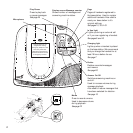
The CHARGING light comes on. Your handset
should come pre-registered to the base station
as HSET1. If the display shows REG, you will
need to register the handset manually by
following the simple steps on page 43, “To
register a handset”.
7
To keep your battery in the best condition, leave the
handset off the base station for a few hours at a
time. (after the initial 16 hour charge)
4. Install the rechargeable battery in
the handset
The Synergy 1500 handset uses a nickel cadmium
(NiCad) battery pack supplied. Hold the handset
with the keypad facing down, remove the clear
plastic directory label cover and memo card and
press and slide open the battery compartment.
Insert the battery pack inside the battery
compartment and slide the battery compartment
cover shut. Replace the memo card and the
directory label cover.
5. Charge the handset battery for at
least 16 hours
Before you use your Synergy 1500 for the first
time it is important to have the handset battery
fully charged. We recommend that you leave the
Synergy 1500 Handset on charge for at least 16
hours. Place the handset on the base station.
7t Edition ~ 8t October ’98
BATTERY
Push
Slide
WARNING
It is recommended that the line cord is not
connected until the handset is fully charged. This
will prevent the risk of the phone being answered
prior to the battery being fully charged and therefore
not working to its optimum capacity.
Battery performance
After charging your Synergy 1500 for the first time,
subsequent charging time for the handset batteries
is approximately 4-5 hours. Batteries and case may
become warm during charging. This is normal and
not dangerous.
Under ideal conditions, the handset battery should
give about 6 hours talktime or 60 hours standby on a
single charge. Please note, however, that the new
NiCad battery, does not reach its full capacity until
it has been in normal use for several days.
Please note that while NiCad rechargeable batteries
can be expected to give years of service they do not
last forever. Their actual lifespan depends on how
heavily they are used but over time, their capacity to
recharge will begin to diminish and they will
eventually need replacing.


















